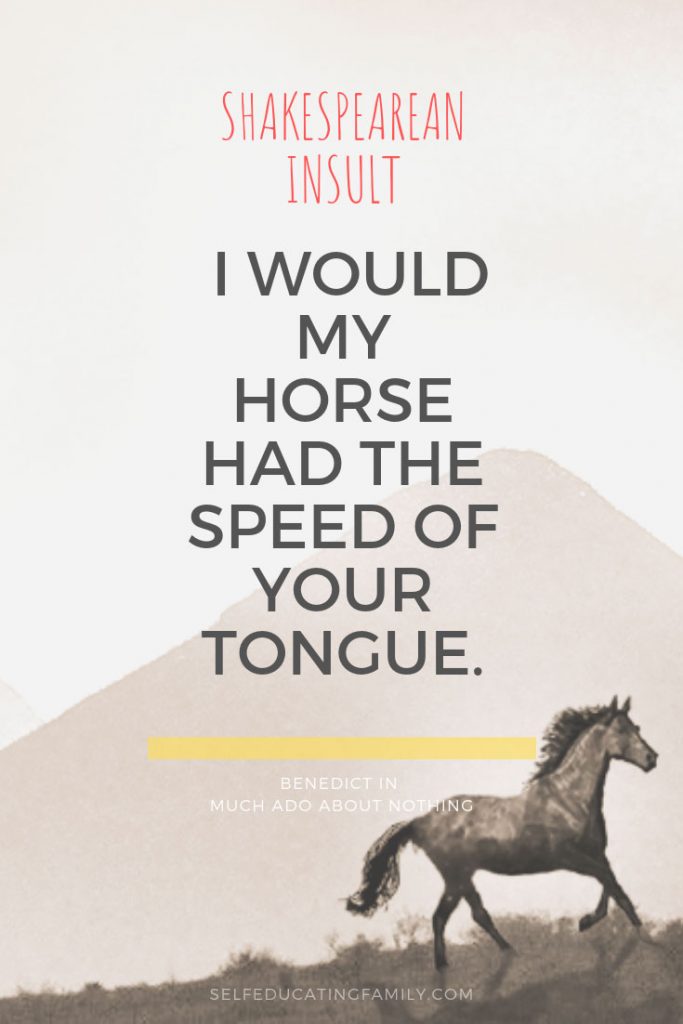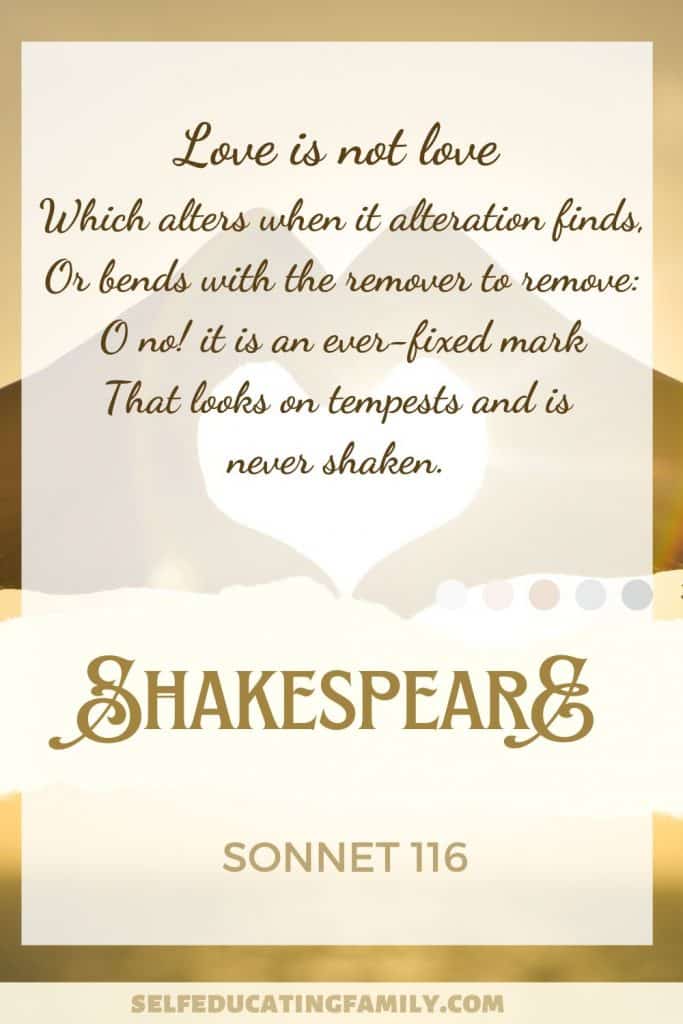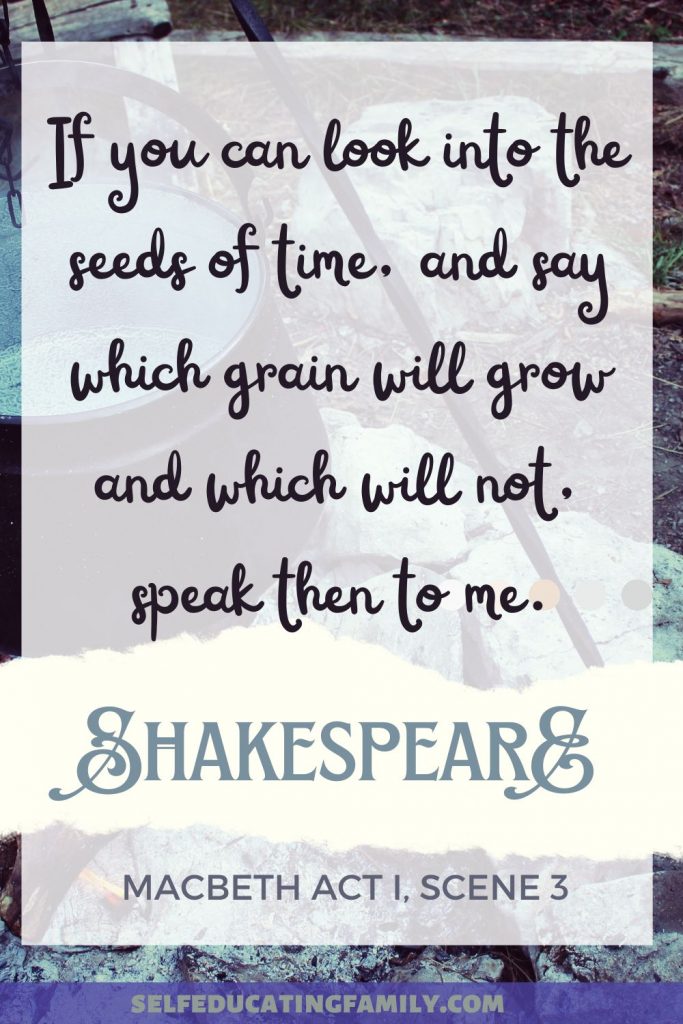Is it important to study Shakespeare?
Yes.
Why?
- He is still relevant.
- His plays are timeless in themes, plots, and characters.
- He tells great stories.
- Shakespeare’s words are very clever.
- There’s got to be something about his work since it has lasted and been copied into modern renditions numerous times.
How Is Shakespeare relevant today?
Naturally, the relevance question must be asked since the guy lived and wrote 400 years ago. He didn’t even have a computer to write his 884,421 words in his 43 works.*
HOW MANY??!!!!
884,421 words! Without a computer. Not counting the revisions. Pencils hadn’t even been invented yet. We are talking quill pens.
Sure, that only adds up to 23 days of non-stop writing for 8 hours a day (without the revisions or any time for actually THINKING about what he was writing.
Still, that’s twice as many words that Tolkien wrote in the Lord of the Rings books (if you include the Hobbit and the Simarillion). But it was probably a lot less than the number of words in all of the 277 books written by Alexander Dumas. Of course, they were in French, so I’m not sure that it is a fair comparison.
Just because he is prolific doesn’t mean he’s relevant
True, relevance is not about quantity. But his words have lasted. And they’re clever. On so many levels.
After adding a few of my favorite quotes from literature or from literary authors to my Commonplace Notebook post, my sons saw one quote I had made but didn’t use in the post. It was one of Shakespeare’s finest insults spoken by Benedict in Much Ado About Nothing.

Benedict is bantering with Beatrice, who unbeknownst to him, will become his future wife – after all, Much Ado IS a comedy, so we know all the couples will work it out and get married in the end.
Side note: Of course, this contrasts with Shakespeare’s tragedies, in which all the couples die, or never become a couple and still die. His tragedies are pretty much guaranteed to have a lot of death in the end, as famously seen in Hamlet: “A play in which all the major players are dead.”
What do we notice about this quote?
- It’s funny. Still. You could maybe update it, “I wish my Maserati could go as fast as your tongue.” Nevertheless, it’s still understandably funny.
- It’s clever. Still.
- It’s got tension between the two main protagonists. You KNOW they are going to get together despite their protests. This classic trick is still used today to further the story.
Note: Modern science fiction writer Robert Heinlein wrote of what he called one of 3 human interest plot lines as “boy-meets-girl”. Shakespeare uses this plot line often in the comedies.
Is Shakespeare too difficult to be studied today?
Ridiculous! The notion that Shakespeare is too hard is laughable. What, did people get stupider in the past 400 years? (Ha, ha – did you see the grammatical error in the last question?!!)
However, in order to enjoy Shakespeare and study it today, you have to get over the difficulty factor.
- Difficulty #1:Language: Shakespearean English is almost like a different language. Plus, he often coined his own new words now and then. If you are reading Shakespeare, get a translation that explains the out-of-use words. The Folger editions have many good references. The No Fear editions have complete modern side-by-side translations.
- Here’s a word he uses a lot that no one really uses today – “anon”. It means “in a little bit,” as in, “Prithee, I will come anon.” That gent uses lots of w’rds liketh yond. (Or “He uses lots of words like that” – translated from LingoJam.)
- Look at this! He coined the verbing of the work “friend” long before Facebook!
And what so poor a man as Hamlet is
May do, to express his love and friending to you
—Hamlet, Act 1, Scene 5
- Difficulty #2: Speed of the words: In the actual plays, many versions have rapid-fire exchanges. Familiarity with the text can help with this.
- A good example is the Benedict-Beatrice exchange mentioned above. The line Benedict says is one of a bunch back and forth in an argument with Beatrice. Very funny insults throughout. But very quickly exchanged, usually.
- Difficulty #3: Historical context: Shakespeare was writing for his audiences who knew what was going on then, but how well do you know your history?
- Shakespeare was written in the Elizabethan era – that mean Queen Elizabeth (the First) was reigning in a gloriously long reign. But she was unmarried and had no heir, so that was on people’s minds. Now, look at Hamlet or Macbeth. There is court intrigue with assassinations and people trying to overthrow the government to usurp the ascendancy of the crown. Shakespeare’s audiences would have known about this and seen parallels in circumstances, if not in some of his comments by various characters.
So, basically, Shakespeare might be hard at first, but it’s worth it. You can handle it.
What is so special about Shakespeare that he is even known today?
Here’s a look at some quotes from his work that you may have heard before that show why Shakepeare is still important today.
Timelessness
So many of his words are quite timeless and they still describe the human condition today. You might never have known that they were written so long ago.
- “The course of true love never did run smooth.” —Midsummer’s Night Dream, Act I, Scene 1.
- “True is it that we have seen better days…” —As You Like It, Act II, Scene 7
- “If you prick us, do we not bleed? If you tickle us, do we not laugh?” —Merchant of Venice, Act III, Scene 1.
- “How poor are they that have not patience? What wound did ever heal but by degrees?” —Othello, Act II, Scene 3.
Themes that are still valid today
More themes that run throughout Shakespeare:
Politics
“Uneasy lies the head that wears a crown.” —Henry IV Part 2, Act 3, Scene 1
“Something is rotten in the state of Denmark.” —Hamlet, Act 1,Scene 4
“Get thee glass eyes, and like a scurvy politician, seem to see the things thou dost not.” —King Lear, Act 4, Scene 6.
Love

““Love comforteth like sunshine after rain.”
—Venus and Adonis
“Love all, trust a few, Do wrong to none” —All’s Well That Ends Well, Act I, Scene 1
Appearance vs reality
“Men should be what they seem” —Othello, Act III, Scene 3
“If this were played upon a stage now, I could condemn it as an improbable fiction.” —Twelfth Night, Act III, Scene 4
“All that glitters is not gold.” —Merchant of Venice, Act II, Scene 7
Brilliance of great stories
- Shakespeare’s stories are completely engaging.
- “Shakespeare didn’t care if you were a street sweeper or the Queen of England, his stories were for anyone with a beating heart. That was his genius.” –Nick Maccarone in an article from the Writing Cooperative.
- Clever
- You can see most of Shakespeare’s cleverness in his word play and descriptions.
- Shakespeare had to appeal to an audience full of lowbrow and highbrow people – people from all classes.
- In Shakespeare’s plays, there usually are “low brow” characters who would appeal to the “pit” – the people who could only afford to stand in the pit nearest the stage instead of in the more expensive boxes and seats. Shakespeare’s words can make them very clever or very stupid.
- These lowbrow characters often had some of the funniest lines.
- “A man may break a word with you, sir, and words are but wind
Ay, and break it in your face, so he break it not behind.” —Comedy of Errors, Act III, Scene 1.
- “A man may break a word with you, sir, and words are but wind
Note: Bathroom humor and bawdiness sometimes goes over the heads of younger people. In our co-op which included Shakespeare, the older highschoolers would snicker quietly, but the younger ones usually didn’t notice when we did readings. Tip! Pre-screen any film versions you watch, because some directors play the bawdiness up more.
My Personal Top 5 Favorite All-Time Shakespeare Plays
- Hamlet
- Midsummer’s Night Dream
- Macbeth
- Comedy of Errors
- Much Ado About Nothing
By the way, my list agrees with 3 of 5 of the Top 5 Favorite Shakespeare Plays as recognized by Bard Aficionados worldwide. The list differs because of Comedy of Errors and Much Ado. I think I just prefer the comedies over the tragedies. The official list replaces these with Romeo & Juliet and The Tempest.
If you need bookmarks with the greatest quotes from these plays, check out my shop where I have over a dozen plays and the best quotes from each on bookmarks for using during your studies.
Parting words
“We probably read Shakespeare in the first place for his stories, afterwards for his characters. . . . To become intimate with Shakespeare in this way is a great enrichment of mind and instruction of conscience. Then, by degrees, as we go on reading this world-teacher, lines of insight and beauty take possession of us, and unconsciously mold our judgments of men and things and of the great issues of life.”
Charlotte Mason
For More on Shakespeare
- How to Plan Shakespeare for Your Homeschool Year
- Shakespeare’s Genius
- 10 Shakespeare Plays Everyone Should Read
- Shakespeare translators:
- Why is Shakespeare Important Today:
Other references
Final Thought
‘Be not afraid of greatness: some are born great, some achieve greatness and some have greatness thrust upon them.’’ Shakespeare said that.

